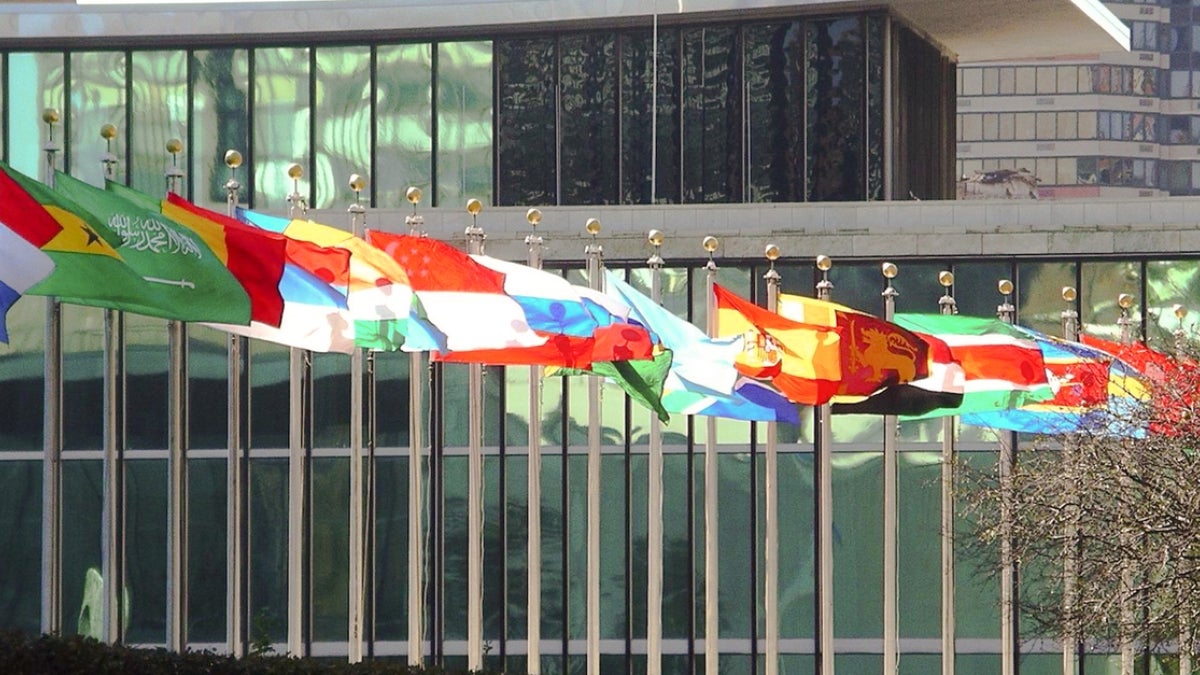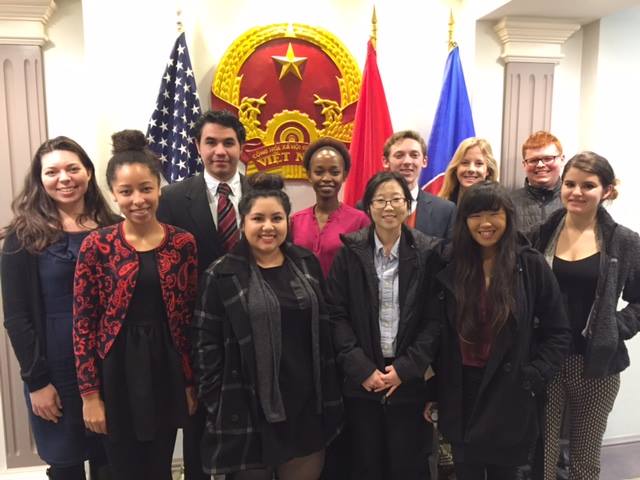President Barack Obama is scheduled to travel to Vietnam next month, and a class at Arizona State University’s Washington Center is researching what he should do while he’s there.
Global studies major Caitlin O’Grady has looked into what it would mean for the president to make remarks about decreasing corruption in the business sector of that developing economy.
Connor Murphy, a journalism and political science student at ASU, has suggestions for the president about selling weapons to Vietnam.
And Irene Kinyanguli, who is studying public policy, wrote the president some talking points about the Trans-Pacific Partnership.
None of these students is interning at the White House or the State Department. (And by the way, interns there don’t get such cool assignments.)
But they sure could.
The three, all juniors, are studying this semester in the McCain Institute’s Washington Policy Design Studio, a semester-long seminar that puts students in roles of a U.S. embassy in a foreign land.
“I would describe the course as very practical,” said O’Grady. “… It’s structured as you would work in the U.S. government.”
The 2016 spring semester Washington Policy Design Studio students: (back row, from left) Megan Kelly, Enrique Carassco, Irene Kinyanguli, Connor Murphy, Caitlin O’Grady and Ben Martin; (front row, from left) Skyler Daviss, Amber Orquiz, Kelly Chung, Jenny Ung and Oona Zachary. Photo by McCain Institute
And that’s the point. The Washington Policy Design Studio, led by McCain Institute senior director Michael Polt, puts ASU students in the roles of foreign service officers abroad and asks them to do those jobs to complete the course.
“We don’t do imaginary scenarios,” said Polt, the former U.S. ambassador to Estonia (among other posts). “We take the actual, real relationship between the United States and Vietnam, or the United States and Germany, or the United States and Mexico, and we make that the scenario that we actually work.”
This semester it’s Vietnam. By good planning, or a stroke of luck, students currently enrolled have gotten to work on an exciting event for any in-country diplomat — the impending arrival of the commander-in-chief.
But let’s back up for a second.
Students start the semester learning how embassies work. They then focus on how the specific diplomatic outpost they’ll be studying works.
And they’re each assigned a job to do as part of the class, with a real counterpart in the embassy they’re focusing on. They interact, via email and occasional phone calls, with the people who actually hold the jobs into which the students are taking a deep dive.
Murphy’s role in the class is as the deputy chief of mission — the No. 2 — for Embassy Hanoi. He has forged a great relationship with the actual DCM some 8,000 miles away.
“She’s been pretty frank about what it was like to work on the ground,” Murphy said, “and that’s been really insightful.”
In the class, the students research the bilateral relationship between the two nations, respond to issues in real time, and work on many of the same things the actual embassy is focused on — hence the preparations for Obama’s trip.
And though their recommendations aren't actually going to the White House, they're tackling the same problems that real foreign service officers are facing as they're facing them.
Kinyanguli, who is from Tanzania, is the foreign commercial service officer in the Washington Policy Design Studio version of the Hanoi embassy. That means her work for the class deals with the trade relationship between the U.S. and Vietnam, and she thinks about ways to ensure that the embassy is helping create jobs for Americans.
“Everyone has a role to play,” said Kinyanguli, whose career aspirations have shifted more toward foreign policy since enrolling in this class. “You have to contribute to the whole team. Without you, the work is not done.”
On Wednesday, students will give their final presentations to a panel of seasoned diplomats including a former U.S. ambassador to Vietnam.
That’s a lot of pressure, but the real jobs are pressure-filled as well.
“[We want to] teach them some of those skills of good speaking, good writing, clear thinking, perpetual learning, solid management and leadership skills that will serve them well no matter what professional capacity they plan to function in after they leave the university,” Polt said.
“We want to provide access for our ASU students into that exclusive club of working on foreign policy.”
— Ambassador Michael Polt, McCain Institute Senior Director
The class hews closely to the model of so many of the courses at ASU, which put practical experience on the same plane as academic knowledge.
And, actually, calling it a “class” may not give it enough credit, according to Polt.
“It’s not a class in foreign policy; it is a foreign policy development and implementation experience,” he said. “… We want to provide access for our ASU students into that exclusive club of working on foreign policy.”
And it’s working. Murphy’s point of contact in Hanoi, essentially the deputy ambassador, is supportive of his application to intern in the actual U.S. embassy in Vietnam next spring because of the rigor she knows the Policy Design Studio requires.
And O’Grady has already landed a coveted foreign service internship. This summer she’ll be in the U.S. embassy in Macedonia.
“I am really excited to put what I learned into practice,” she said.
More Law, journalism and politics

ASU committed to advancing free speech
A core pillar of democracy and our concept as a nation has always been freedom — that includes freedom of speech. But what does that really mean?Higher education doesn’t have an agenda to curate a…

ASU experts share insights on gender equality across the globe
International Women’s Day has its roots in the American labor movement. In 1908, 15,000 women in New York City marched to protest against dangerous working conditions, better pay and the right to…

ASU Law to offer its JD part time and online, addressing critical legal shortages and public service
The Sandra Day O’Connor College of Law at Arizona State University, ranked 15th among the nation’s top public law schools, announced today a new part-time and fully online option for its juris doctor…

